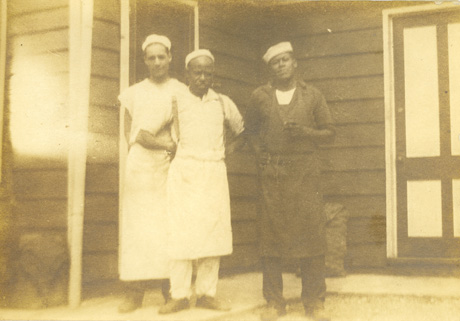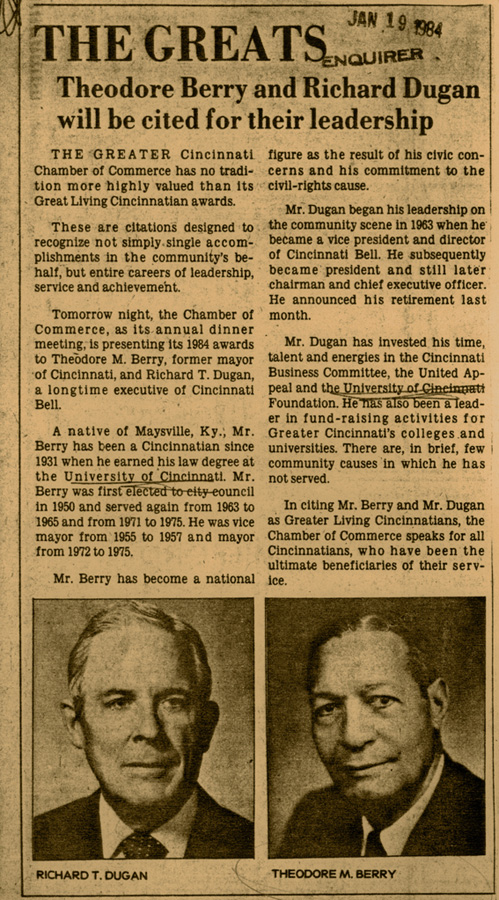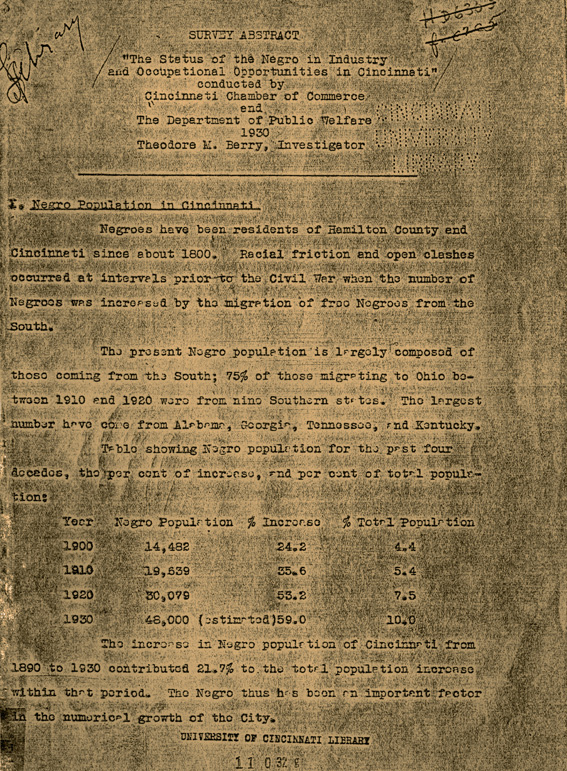By Laura Laugle
In 1984, while Theodore M. Berry was heavily involved in the battle to end racial segregation in Cincinnati Public Schools, the Cincinnati Chamber of Commerce chose him as a “Great Living Cincinnatian.” This prestigious designation by the Chamber is part of the organization’s annual honor conferred on local citizens who have made a substantial impact on Cincinnati life. Joining Berry in being honored that year was Cincinnati Bell CEO, Richard T. Dugan. Every year since 1967, the Chamber of Commerce (now called the Cincinnati USA Regional Chamber) has chosen a select few Cincinnatians as “Great Living Cincinnatians” based upon their achievement in five categories over a lifetime of work: community service, business and civic attainment on a local, state and national or international level, leadership, awareness of the needs of others, and distinctive accomplishments that have brought favorable attention to their community, institution or organization.

Theodore Berry is pictured here (far left) at Fort Scott Camp with friends and fellow cooks the Steel brothers in 1925.
Being that at the time, Berry was a former Mayor of the city, a former director of a federal agency, and a prominent attorney, his selection for the civic award seems obvious. But Berry’s history with the Chamber of Commerce goes back much further than most know. In fact, it was the Cincinnati Chamber of Commerce which offered Berry his first real career opportunity in 1930. Berry had worked his way through school as a shoeshine boy, a redcap on the railroad, a page at Cincinnati Public Library, and a cook at a local summer camp, and for many of those early years made a home not in a house with a loving family, but at the local “Negro Y” on 9th Street in downtown Cincinnati. It was here that he met and befriended Fred Hoehler, then the director of that branch of the YMCA. By the second semester of his junior year, Berry had fortunately found a home outside of the YMCA and Hoehler moved on to the Department of Public Welfare where Berry sometimes visited him. In a 1993 interview with the Cincinnati Post, Berry states “On one such visit,… I suggested a survey be made of employment opportunities for Negro workers in Cincinnati. And he said, ‘Well, why don’t you do it?’ I told him I couldn’t. But He put me on the staff as a special social-work investigator. It was my first foray into socio-economic concerns.” In his survey abstract from the project Berry states,
“The future possibilities for Negro workers do not appear to be favorable, judging from the survey. More than 85% of the employers answered negatively or were silent to the question whether they would employ more Negroes, if competent.”
The project was sponsored by the Chamber of Commerce and the resulting experiences and findings of rampant and blatant discrimination helped guide Berry down the civically and politically minded paths which he would follow throughout his career.
Some may consider it odd then that only a few years later, while Berry was chairman of the Ohio Committee for Fair Employment, he was forced into battle against the Chamber of Commerce in his attempt to pass the Ohio Fair Employment Practices Law. Although the Chamber obviously knew of the problem of employment discrimination in Greater Cincinnati, thanks to Berry’s survey, they opposed the passing of legislation to remedy the problem. When the law did pass in 1959, fourteen years after Berry began fighting for it, the agency refused to enforce it even when it concerned large companies with blatant discriminatory practices like Proctor & Gamble, which Berry says “didn’t change its employment policy until the riots of ’67.”
At some point, however, the Chamber hopped on the fair employment train and they and Berry got along well from then on – the relationship secured with the presentation of this award. Today, Berry is featured with a short biography on the Chamber of Commerce’s website along with his fellow “Great Cincinnatians.” Since 1967, 126 citizens have been so-honored during their lifetimes.
For more information please see: The Cincinnati Chamber of Commerce Great Living Cincinnatians: Theodore M. Berry (This page lists Berry’s birth year as 1906 but it is 1905. The biography states that Berry served on City Council for three terms; however, he actually served four: 1949-1951, 1951-1953, 1953-1955 and 1971-1972 in addition to his one term as Vice Mayor from 1956 to 1957, and 1 ½ terms as Mayor from 1972 to 1975) and The Cincinnati Post article, Berry: Dedicated to Rewriting Odds by David Wecker.
In 2010, the University of Cincinnati Libraries received a $61,287 grant from the National Historical Publications and Records Commission of the Archives and Records Administration to fully process the Theodore M. Berry Collection in the Archives & Rare Books Library. All information and opinions published on the Berry project website and in the blog entries are those of the individuals involved in the grant project and do not reflect those of the National Archives and Records Administration. We gratefully acknowledge the support of NARA.



